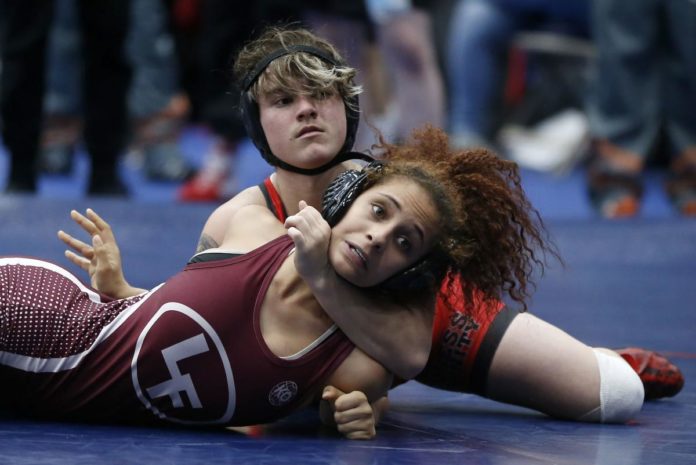
As of late last month, 19 states — or nearly 40 percent of the country — have, or will, implement laws prohibiting or limiting the participation in sports by transgender high school student-athletes.
Transgender sports weren’t a blip in the national conversation 50 years ago when Title IX, which broadly prohibits sex discrimination in any education program or activity receiving federal financial assistance, was enacted.
Although the Department of Education a year ago held that Title IX should protect gay and transgender athletes and afford them an opportunity to compete, that has not stopped many states from powering forward to exclude them from doing precisely that.
This has, in turn, sparked a plethora of complicated and polarizing political debates as battle lines are drawn with frequently nasty discourse all around the country.
While New Mexico has not been entirely immune to this ideological tug of war, the state, by and large, has remained out of the fray.
But might that change?
“I can’t predict the future,” said Sally Marquez, the executive director of the New Mexico Activities Association, the governing body that oversees day-to-day high school and middle school athletics. “The NMAA’s (job), as an association, is and was to make sure we have a level playing field across the state, and we will continue to make sure that that is what occurs in New Mexico.”
The language on the books with the NMAA devotes just a single sentence in Section 6.1 of its handbook to the topic of transgender athletes:
“Participating students are required to compete in the gender listed on their original or amended birth certificate.”
The process to change or amend a birth certificate in New Mexico is relatively straightforward for anyone 18 years and older, as it requires the completion of a one-page form, which is to be signed in the presence of a notary.
For minors, a change in gender designation in essence requires only the confirmation signatures of both parents listed on the original New Mexico birth certificate.
Marquez was asked directly if she had knowledge of any transgender student-athletes who have competed in New Mexico. She declined to comment, citing privacy issues.
But data exist suggesting New Mexico almost certainly has had multiple transgender students participating in a sport. A 2019 survey conducted by the Centers for Disease Control and Prevention revealed that an average of 1.8% of high school students (or nearly 300,000) nationwide identify as transgender. An Associated Press story recently added: Fewer than 15% of all transgender boys and transgender girls play sports.
Rodrigo Heng-Lehtinen, executive director of the National Center for Transgender Equality, told the AP that the bans are excessive.
“It puts a target on the backs of trans youth and makes them feel unsafe,” Heng-Lehtinen said. “These state bans are sweeping. They categorically exclude a group of people from playing any kind of sport at any level.”
As the NMAA answers to the Public Education Department in Santa Fe, the PED has the latitude to review or change NMAA policy, said Mark Geiger, the NMAA’s attorney and someone well versed in the transgender issue.
“Nothing that I’ve seen has been (set) about how the PED would authorize us to act, or what they would do if they were to review one of our board (of directors’) decisions,” Geiger added. “The law is not real clear in New Mexico, because we haven’t had any court cases or definitive rulings.”
Any number of Republican-led states — Tennessee is an example — either already have signed into law or are pushing forward with language that will exclude transgender athletes from competition.
This has even been a topic of conversation, and a source of contention, in Santa Fe.
Just last year, a handful of Republican lawmakers attempted to push through a bill, House Bill 304, called the Women’s Sports Protection Act. It would have required New Mexico’s schools to prohibit male participation on a female athletic team, and laid out a firm delineation featuring only two biologic sexes, both revealed at birth. The bill further asserted that there are natural physical differences between boys and girls that create a competitive gap.
Not surprisingly with New Mexico’s Democratic stronghold, the bill failed to pass. Just as similar proposals failed in a few other states.
“I absolutely expect that that bill, or some version of that bill, will be introduced again,” said Marshall Martinez, the executive director of Equality New Mexico, which describes itself as “New Mexico’s statewide LGBTQ advocacy and civil rights organization.”
“We expect these attacks, (and) we expect to see this in the coming Legislative session.”
There are a couple of prominent national examples that illustrate the complexity of the transgender controversy.
At the collegiate level, there is the high-profile case of Lia Thomas from the University of Pennsylvania, who competed on the men’s swim team for three years before transitioning. She eventually dominated in the pool this last season, drawing ire and scorn even from within her own team.
“I just want to show trans kids and younger trans athletes that they’re not alone,” she told Sports Illustrated in a March 2022 profile. “They don’t have to choose between who they are and the sport they love.”
Next door to New Mexico, there was a high school case five years ago in Texas that made headlines.
Mack Beggs of Euless, Texas, had been identifying as a boy for years, but state rules prohibited Beggs from wrestling in Texas’ boys state tournament. He ended up winning a girls state title in 2017.
Texas’ high school governing body cited a rule that said that wrestlers can only compete against their own gender, a designation that must appear on an original birth certificate.
States like Tennessee, which plans to punish schools that permit competition by transgender athletes in girls’ sports, are actively defying the DOE’s summer 2021 declaration. Those same athletes are now being treated essentially as outcasts in states that are claiming that they are not protected by law. Idaho two years ago was the first state to move forward on a ban at the youth and high school level.
“It’s a pretty fluid situation as far as what the federal government is doing, and what other states have been doing,” said Geiger. “We’re keeping an eye on all that. It’s evolving day to day.”
Legally, there figure to be challenges — already in Utah, two families last month filed a lawsuit challenging a state law that banned transgender women and girls from sports participation. The families asked a court to declare the ban unconstitutional. Similar lawsuits have been filed in other states, and in Minnesota, there was even a bill that called for a criminal penalty against transgender girls who forge ahead to compete in a girls’ sport.
“I think in any situation, communication is key,” Marquez said, asked about her association’s relationship with politicos in Santa Fe. “Whether that’s on a transfer student, or COVID, or transgender, or any of those. And that’s what I will continue to focus on.”
Any future rulings or decisions on transgender athletes in New Mexico, should they arise, would ultimately fall on the shoulders of the NMAA’s board of directors, which is a blend of rural and urban educators. But there is a mechanism set up where even if an individual were to get an unfavorable ruling from the board, they are permitted to file a last-ditch appeal directly to the PED.
“When a situation does come up, I’ll have to advise the board as to the strengths or weaknesses of a specific case,” Geiger said. “To add to that, I don’t know which direction this board would want me to go.”
Marquez admits she has given thought to a situation like the one regarding the swimmer Thomas at Penn, and the potential fallout .
“I would say that New Mexico’s process of changing a gender on a birth certificate is in the forefront of many states,” Marquez said. “Thus, the NMAA is choosing to follow state statute.”
Martinez said New Mexico is well equipped to square up on this issue should it someday reach the inside of a courtroom.
“I don’t believe New Mexico, at our core, believes in a world where we’re trying to single out or exclude or shame people,” he said. “Especially young people, because of their identities.”







